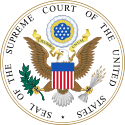- Justiciability
-
Justiciability concerns the limits upon legal issues over which a court can exercise its judicial authority.[1] It includes, but is not limited to, the legal concept of standing, which is used to determine if the party bringing the suit is a party appropriate to establishing whether an actual adversarial issue exists.[2] Essentially, justiciability in American law seeks to address whether a court possesses the ability to provide adequate resolution of the dispute; where a court feels it cannot offer such a final determination, the matter is not justiciable.
In the United States

United States Federal
Civil Procedure DoctrinesJusticiability Advisory opinions Standing · Ripeness · Mootness Political questions Jurisdiction Federal question jurisdiction Diversity jurisdiction Supplemental jurisdiction Removal jurisdiction Amount in controversy Class Action Fairness Act of 2005 - Personal jurisdiction:
In personam In rem jurisdiction Quasi in rem jurisdiction Federalism Erie doctrine · Abstention Sovereign immunity · Abrogation Rooker-Feldman doctrine Adequate and
independent state groundedit this template Justiciability is one of several criteria that the United States Supreme Court use to make a judgment granting writ of certiorari ("cert.").
In order for an issue to be justiciable by a United States federal court, all of the following conditions must be met:
- The parties must not be seeking an advisory opinion.
- There must be an actual controversy between the parties,[3] meaning that the parties can not agree to a lawsuit where all parties seek the same particular judgment from the court (known as a collusive suit or friendly suit); rather, the parties must each be seeking a different outcome.
- The question must be neither unripe nor moot.[4]
- An unripe question is one for which there is not yet at least a threatened injury to the plaintiff, or where all available judicial alternatives have not been exhausted.
- A moot question is one for which the potential for an injury to occur has ceased to exist, or where the injury has been removed. However, if the issue is likely to reoccur, yet will continually become moot before any challenge can reach a court of competent jurisdiction ("capable of repetition, yet evading review"), courts may allow a case that is moot to be litigated.[5]
- The suit must not be seeking judgment upon a political question.[6]
- Political questions involve matters where there is:
- "a textually demonstrable constitutional commitment of the issue to a coordinate political department" (meaning that the U.S. Constitution requires another branch of government to resolve questions regarding the issue); or
- "a lack of judicially discoverable and manageable standards for resolving it."
- Political questions include such issues as whether the nation is 'at war' with another country, or whether the U.S. Senate has properly "tried" an impeached federal officer.
- Political questions involve matters where there is:
If the case fails to meet any one of these requirements, the court cannot hear it.
State courts tend to require a similar set of circumstances, although some states permit their courts to give advisory opinions on questions of law, even though there may be no actual dispute between parties to resolve.
In the United Kingdom
The issue of non-justiciability has been recognized in Buttes Gas,[7] where it was stated that this principle is not a matter of digression, but is 'inherent in the nature of the judicial process'.[8][9] The principle was further developed in Kuwait Airlines[10] litigation.[11]
References
- ^ May, Christopher N.; Ides, Allan (2007). Constitutional Law: National Power and Federalism (4th ed.). New York, NY: Aspen Publishers. pp. 97–99.
- ^ Flast v. Cohen, 392 U.S. 83, 100 (1968) (“[W]hen standing is placed in issue in a case, the question is whether the person whose standing is challenged is a proper party to request an adjudication of a particular issue, and not whether the issue itself is justiciable.”).
- ^ Muskrat v. United States, 219 U.S. 346 (1911)
- ^ Poe v. Ullman, 367 U.S. 497 (1961); DeFunis v. Odegaard, 416 U.S. 312 (1974)
- ^ Roe v. Wade, 410 U.S. 113 (1973)
- ^ Nixon v. United States, 506 U.S. 224 (1993)
- ^ Buttes Gas and Oil Co. v. Hammer [1982] AC 888
- ^ McGoldrick, Dominic (2010) THE BOUNDARIES OF JUSTICIABILITY, 59 International and Comparative Law Quarterly 981
- ^ Martyniszyn, Marek (2011) Avoidance Techniques: State Related Defences in International Antitrust Cases, CCP Working Paper No. 11-2
- ^ Kuwait Airways Corp. v. Iraqi Airways Co. [2002] UKHL 19
- ^ Case note: Kuwait Airways Corporation v Iraqi Airways Company, Janeen M. Carruthers and Elizabeth B. Crawford, The International and Comparative Law Quarterly, Vol. 52, No. 3 (Jul., 2003), pp. 761-774
Categories:
Wikimedia Foundation. 2010.

